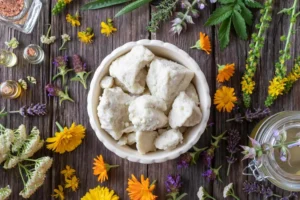Table of Contents
Shea Butter: Comprehensive Guide to Benefits, Uses, and Expert Tips
Introduction to Shea Butter: What Makes It So Special?
Shea butter, derived from the Butyrospermum parkii tree native to Central Africa, has long been celebrated for its remarkable moisturizing properties. Unlike other plant-based oils, shea butter is packed with vitamins A and E, which aid in skin healing and regeneration, making it an essential ingredient in both cosmetics and natural skincare products.
Its unique composition offers anti-inflammatory, antioxidant, and even mild sun-protective properties. But shea butter’s benefits go beyond just skin care—read on to discover why this natural product is so versatile.

Shea Butter: Comprehensive Guide to Benefits, Uses, and Expert Tips
Why Shea Butter is Exceptional for Skin Health
Shea butter’s skin-nourishing qualities come from its deeply hydrating and emollient properties, which lock in moisture and promote elasticity. According to the National Center for Biotechnology Information, shea butter is rich in anti-inflammatory compounds that help reduce redness and swelling associated with various skin conditions.
What Makes Shea Butter Stand Out?
In addition to its moisturizing power, shea butter contains essential fatty acids like oleic and stearic acid, providing a protective layer on the skin. Unlike many other natural oils, shea butter does not clog pores, making it suitable for all skin types, even oily and acne-prone skin. Learn more from NCBI on the health benefits of shea butter.
The Origin and Composition of Shea Butter
Where Does Shea Butter Come From?
Shea butter is derived from the nut of the shea tree, a resilient species found primarily in the savannas of West and Central Africa. Traditionally, the butter is hand-extracted through a labor-intensive process that involves crushing, roasting, and kneading the shea nuts to release their oils. This raw, unrefined butter is highly valued for its purity and effectiveness.
Shea Butter’s Nutrient-Rich Composition
The unique combination of fatty acids in shea butter, including oleic, stearic, and linoleic acids, contributes to its restorative qualities. These fatty acids allow shea butter to remain solid at room temperature but melt upon skin contact, making it easy to apply. In fact, shea butter contains around 45-50% oleic acid and 30-41% stearic acid, alongside essential vitamins.
Top Benefits of Shea Butter
1. Anti-Aging and Skin-Softening Properties
Shea butter is a superb moisturizer that helps keep skin hydrated and firm, thereby reducing the appearance of wrinkles and fine lines. The fatty acids and vitamins encourage collagen production, giving skin a plump and youthful look. A study even found that shea butter can prevent photo-aging and support tissue regeneration, proving beneficial for mature skin.
2. Anti-Inflammatory Effects
Studies, including those published in the Journal of Oleo Science, reveal that shea butter has powerful anti-inflammatory properties. This is particularly helpful for conditions like eczema, psoriasis, and dermatitis, where soothing inflammation is key to healing.
3. Hair and Scalp Moisturization
Shea butter provides essential nutrients for scalp health and helps combat dandruff. It is a fantastic natural conditioner that penetrates the hair shaft, sealing in moisture and protecting against environmental damage. Unlike coconut oil, which can sometimes clog hair follicles, shea butter is lighter and easier to rinse out.
4. Relief for Winter Dry Skin and Sunburn
During cold or dry weather, shea butter works wonders for relieving chapped and cracked skin. Its deeply moisturizing nature is ideal for elbows, heels, and other rough areas. Shea butter also provides a mild barrier against UV rays, offering additional protection for sunburn-prone skin.
5. Stretch Mark Prevention and Scar Reduction
Shea butter’s vitamin-rich profile, particularly its natural vitamin A content, helps improve skin elasticity and aids in collagen production. This makes it useful for reducing the appearance of stretch marks, especially when applied regularly during pregnancy.
6. Natural Diaper Rash Treatment
For parents looking for a gentle, non-toxic alternative to store-bought diaper creams, shea butter offers an effective solution. Its anti-fungal and anti-inflammatory properties help soothe and heal diaper rash while minimizing exposure to chemicals.
Practical Uses of Shea Butter in Your Daily Routine
DIY Skincare with Shea Butter
- Whipped Body Butter: Combine shea butter with coconut oil and essential oils for a luxurious, hydrating body cream.
- Moisturizing Lip Balm: Melt shea butter with beeswax and add a few drops of peppermint oil for a soothing lip balm.
- Natural Shaving Cream: Mix shea butter with olive oil and aloe vera for a smooth, irritation-free shaving experience.
Shea Butter in the Kitchen
While shea butter is primarily known for cosmetic use, in many African cultures, it is also used in cooking, providing a mild, nutty flavor that complements savory dishes. Note that only pure, unrefined shea butter should be used for culinary purposes.
How to Choose and Store Shea Butter
Choosing the Right Type of Shea Butter
When shopping for shea butter, look for unrefined, organic varieties. Unrefined shea butter is light beige and has a natural, nutty aroma. Avoid refined products, as these are chemically processed and lack many of the beneficial compounds found in raw shea butter.
Proper Storage
Shea butter should be stored in a cool, dry place away from light. Its shelf life is approximately 18 months, so using an airtight container can help preserve its freshness and potency. In colder months, shea butter may harden, while warmer temperatures can cause it to soften, both of which are normal.
Precautions and Final Thoughts
Possible Allergies and Side Effects
Although rare, people with tree nut allergies should exercise caution when using shea butter. It’s advisable to conduct a patch test before use. However, there are few well-documented cases of allergic reactions.
Conclusion
Shea butter is a powerful natural ingredient with applications that extend far beyond simple moisturization. From anti-aging properties to scar reduction and baby care, its versatility makes it a valuable addition to any skincare routine. Whether you purchase high-quality shea butter products or opt for DIY skincare solutions, this natural powerhouse has something to offer everyone.